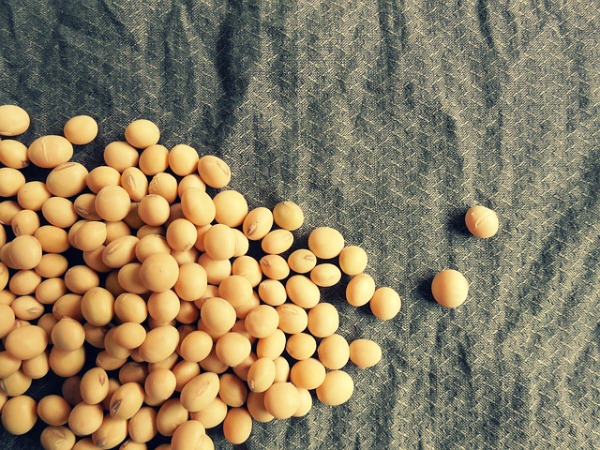The Soy Myth Crushed And The Truth Exposed
[dropcap]I[/dropcap] use to wake up in the middle of the night sweating, wondering who really enjoys Tofu. To me, its unreal and tastes like garbage but the nasty junk sells.
But to you, it may be much more.
It's 9pm and you're balancing your checkbook. Next on the list is reviewing your P&L and checking Facebook, well because it's your obsession. No need to hide it.
As you look into your P&L you notice an error, or maybe it's not. Who knows. You've been experiencing cognitive decline so lets chalk it up to that.
A few minutes after your inability to focus, your stomach begins to gargle and a trip to the bathroom is certain. Other than that everything seems well. Your doctor recently gave you a decent clean bill of health. The only issue was he thought you might have thyroid dysfunction. He ordered a few more tests to get to the bottom of it. No big deal.
Life is good, you don't have heart disease or cancer...yet.
Myths about soy
It’s been long touted that soy estrogens (isoflavones) are good for your health. But then again so was heroin cough suppressant, mercury, tobacco, and Vitamin Water.
I’m sure you’ve heard of the benefits.
- Soy foods provide complete protein.
- Soy foods can prevent osteoporosis.
- Soy foods protect against many types of cancers.
- Soy foods can enhance mental ability.
- Soy estrogens are good for you.
Isoflavones are an estrogen like compound that occurs naturally in soy foods. They are a plant’s natural form of pesticide. In your face Monsanto. They cause the insects that want to chew on them to become sterile.
According to Chris Kresser, “as little as 38 mg isoflavones per day (less than the amount found in 1 cup of soy milk) can result in hypothyroidism with symptoms of lethargy, constipation, weight gain and fatigue. The isoflavones in soy have been shown to cause reproductive problems, infertility, thyroid disease and liver disease in mice, rats, cheetahs, sturgeon, quail, sheep, pigs and marmoset monkeys.”
The fact is that soybeans contain many naturally occurring toxins. All legumes contain toxins which is why it’s best to avoid them.
But soy has higher levels of toxins and the ability to resist the traditional ways of getting rid of them.
Weston A. Price reported that two groups of male mice were fed diets either containing large amounts of soy or no soy at all. The results showed that long-term exposure to dietary soy and phytoestrogens may affect male reproductive function resulting in a small decrease in sperm count and fertility.
Not a good start for the beneficial soy train.
Is soy bad for you?
We consume soy in large numbers. Like large feedlot numbers.
I was looking at the ingredient list of an all natural, gluten free dressing and BAM… soybean oil was one of the top 5 ingredients.
It lurks behind every corner. It stares at you while you're not looking, waiting for the right time to pounce.
Here are 7 adverse effects of unfermented soy:
It contains a high amount of phytic acid which reduces assimilation of calcium, magnesium, copper, iron and zinc. This is known to cause growth problems in children.
Goitrogens are potent agents that block your synthesis of thyroid hormones. This leads to hypothyroidism and thyroid cancer. I know of 3 young woman in my family who have thyroid issues.
Plant compounds phytoestrogen and isoflavones resemble human estrogen and block your normal estrogen, disrupting endocrine function, causing infertility, and increasing your chances of breast cancer.
Soy foods increases your body’s Vitamin D requirement and is the main reason companies add synthetic Vitamin D2 to soymilk. Not good for a population already largely deficient in Vitamin D.
A friendly dose of MSG, which is a potent neurotoxin. MSG is formed during soy food processing and is often times added to mask soy’s not so pleasant taste.
Soy foods contain high levels of aluminum, which is toxic to your kidneys and nervous system. It also contains manganese which will cause issues to your baby’s immature metabolic system.
The question “is soy bad for you” will continue to be debated. But more evidence is pointing to yes. [TWEET THIS]
Other than these 7 adverse effects and the handful of other issues that were left out, unfermented soy is as safe as a peach.
What about Asian cultures you ask
You’re right, Asians cultures consume soy but the traditional soy foods were consumed in small amounts.
They were usually consumed as fermented condiments such as miso, soy sauce, tempeh, and natto.
Tofu was consumed in small amounts with fish broth. This provided beneficial minerals and compounds that actually supported thyroid function.
Soymilk went through a long preparation process that got rid of many anti-nutrients. It was then consumed with shrimp or egg yolk that helped compensate for many of the anti-nutrients that remained. It was typically food for the elderly and never given to growing children.
Looking at all the variables unfermented soy is bad for you. Plain and simple.
If you want to upgrade your mind, body and soul to become the best entrepreneurs you can be, throw it away, kick it down the street, and flush any remanence down the toilet.
Now that we got past the question is soy bad for you, how much do you consume? Do you experience any physical or mental blocks? Comment below.
